DUBAI: The coronavirus pandemic has left people living in the Middle East’s many conflict zones and hot spots more vulnerable than ever, according to a senior UN official. But there will be an opportunity to “build back better” once the storm blows over.
In a recent online talk titled, “Will COVID-19 exacerbate or defuse conflicts in the Middle East?,” organized by the Atlantic Council, Rosemary DiCarlo, UN under-secretary-general for political and peacebuilding affairs, called for a reshuffling of priorities to combat the pandemic, which has placed the region’s long-running conflicts in a different light.
She admitted that there is no good time for a pandemic, but said the outbreak has hit at a difficult moment, with the international community and rules-based order built after World War II under increasing attack.
“Great power rivalry is intensifying,” said DiCarlo.
“Violent conflicts have drawn in regional and global powers and actors, displaced millions and collapsed state and local institutions.”
Before the pandemic, Antonio Guterres, the UN secretary-general, had underscored the urgent need for effective crisis management systems and lines of communication in the Gulf region, she said.
“That need is greater now than ever before. Any miscalculation and the current atmosphere can lead to consequences that could overwhelm the mechanisms that are currently in place.”
DiCarlo drew attention to Guterres’ appeal for a global cease-fire so that all efforts could be aimed at fighting the coronavirus.
“His call has resonated around the world: 115 member states have endorsed his appeal, as have regional organizations, civil society, religious leaders and 24 armed groups,” she said.
According to DiCarlo, the challenges for conflict prevention and resolution efforts include the economic fallout of the pandemic, which could lead to civil unrest and violence.
“As countries slowly lurch back to life from weeks of lockdown, the demands for economic recovery may grow beyond the capacity of many states," she said.
“The rate of unemployment is skyrocketing, and the decline in oil and gas prices is further straining national finances.”
DiCarlo cited the protests and violence in Lebanon and Iraq as reasons for concern given the risk of human-rights violations, adding that the “shrinking civic space” in the region poses an obstacle to fighting the pandemic.
“We've seen discrimination in accessing health services, increased cases of domestic violence, and an overall disproportionate impact on women and on households headed by women,” DiCarlo said.
“Refugees and internally displaced persons, as well as detainees and abductees — many living in crowded and squalid conditions — have been particularly vulnerable. Migrant workers in the Gulf have faced growing pressure to return home.”
DiCarlo said migrant workers were most vulnerable to high prices and food shortages, and faced limited access to health care and crowded living conditions.
To cap it all, there is the continuing threat of terrorism, she said.
In DiCarlo’s view, the pandemic is occupying the attention of governments, giving terrorist groups an opportunity to strike.
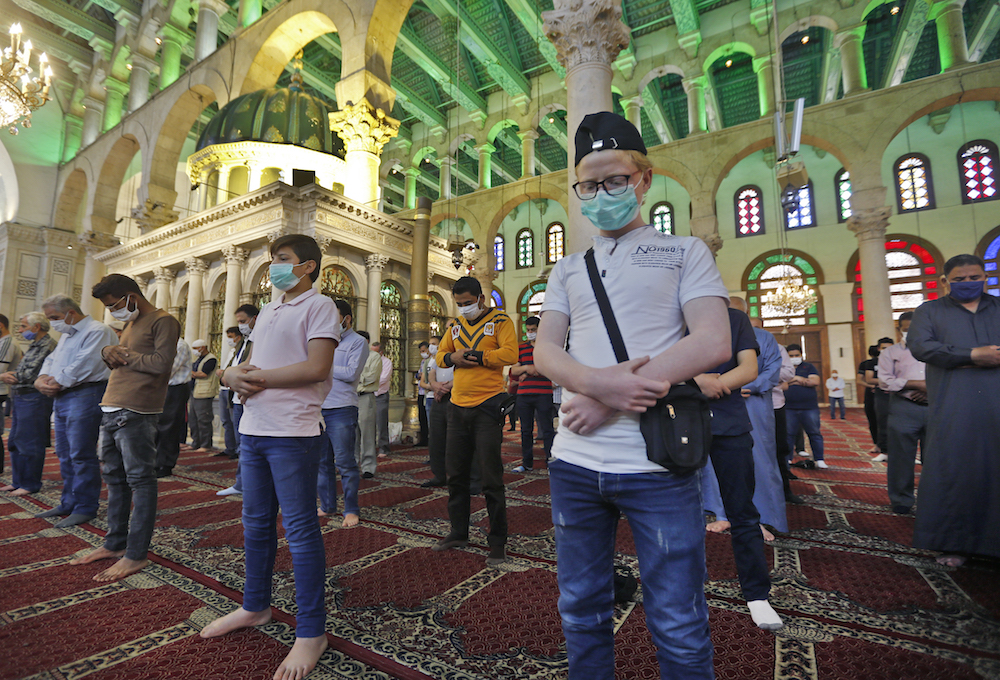
Syrian Muslims wearing face masks attend the Friday prayer at the Umayyad Mosque in Damascus on May 15, 2020, following the authorities' decision to allow prayers on Fridays in disinfected mosques with strict social distancing and protection measures to limit the spread of the coronavirus COVID-19 pandemic. (AFP/File Photo)
“There are reports that Daesh has tried to exploit the pandemic in Iraq and elsewhere, launching new initiatives and intensifying propaganda,” she said.
“Actors in conflict settings could also exploit the confusion created by the virus to press their advantage, leading to a greater escalation of violence that will further complicate efforts for a peaceful resolution.”
In regard to Yemen, international organizations had been asking for funding to shore up their operations in the impoverished country after 75 percent of UN programs had to shut their doors or reduce operations because of a lack of funds.
Saudi Arabia answered the humanitarian call by organizing a pledging event on June 2, co-hosted by the UN, where participants included representatives from more than 125 member states.
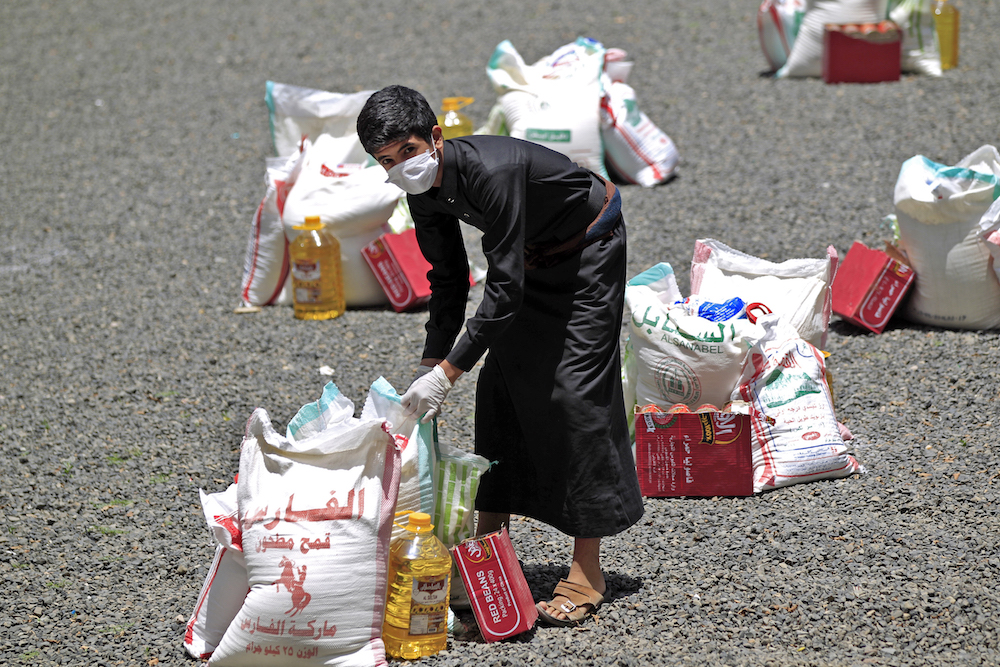
A Yemeni youth carries a portion of food aid, distributed by Yadon Tabney development foundation, in Yemen's capital Sanaa on May 17, 2020. (AFP/File Photo)
At the event, $1.35 billion was pledged, falling short of the $2.5 billion that the organizations said they needed to keep their operations going.
In a subsequent interview with Arab News, Abdallah Al-Mouallimi, Saudi Arabia’s Permanent Representative to the UN, said: “The conference was a huge success for the United Nations and for the Kingdom of Saudi Arabia, for Saudi diplomacy.
“The fact that you can hold such a conference, with such wide participation, under the current circumstances, virtually, and with the economic clouds hanging in the air over the heads of the participants, and then come up with (actual) results — I think that is a major success.”
Al-Mouallimi described the situation in Yemen as “catastrophic, both in terms of the humanitarian situation and in every (other) respect.”
DiCarlo likewise said Yemen faces one of the “gravest humanitarian challenges in the world.”
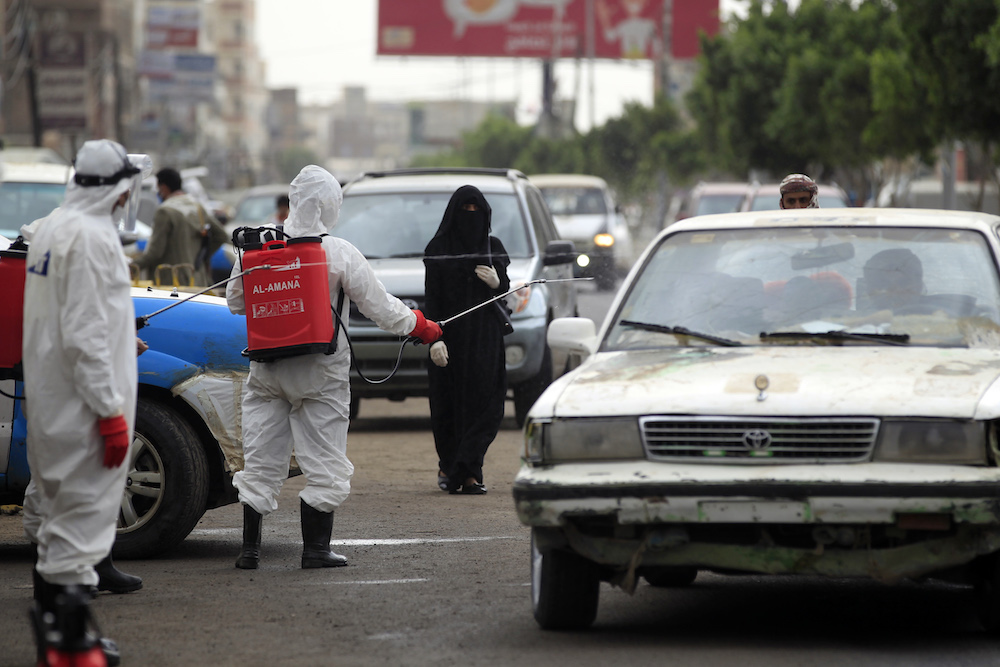
Yemeni workers wearing protective outfits spray disinfectant on a car in the capital Sanaa, during the ongoing novel coronavirus pandemic crisis, on May 21, 2020. (AFP/File Photo)
Noting that Arabia was “very committed” to seeing a peaceful resolution to the conflict, she said the Kingdom did declare a unilateral ceasefire and does “understand that there is not a military solution to the disagreements among the various parties, that it has to be negotiated.”
On Syria, DiCarlo said cease-fire agreements are fragile and humanitarian efforts on the front lines insufficient.
The need for continued and expanded cross-border assistance could not be overstated. “Progress on the UN-led political process remains elusive, despite our efforts,” she said.
Recent developments in war-torn Libya are also doing little to inspire optimism. “When parties have called for humanitarian truces at various times in the past, the conflict has intensified,” DiCarlo said.
THE NUMBERS
COVID-19 in the Middle East
- Over 16,000 Libyans displaced by recent military movements in Greater Tripoli and Tarhouna.
- 80,000 Syrian refugees in Jordan’s Zaatari camp closed off by authorities during a two-month lockdown.
- 15 million Yemenis, or half the country’s population, may become infected, resulting in more than 40,000 deaths, says WHO.
- 1 in 5 Syrian refugees in Turkey do not have access to clean water.
- 75% of Lebanese people in need of aid, with the pound losing 60% of its value as of May.
- 115 UN member states have endorsed global cease-fire to fight pandemic
The COVID-19 crisis has prompted many Arab countries to step up humanitarian efforts, with the UAE, Kuwait, Oman and Qatar providing much-needed medical equipment and assistance to Iran. However, the pandemic has not proven to be the olive branch for ending the region’s divisions.
Despite the seemingly intractable issues, great opportunity awaits, DiCarlo said, adding that the UN is hoping that the region will explore this in the near future.
She said the pandemic has been a catalyst for much-needed cooperation and dialogue.
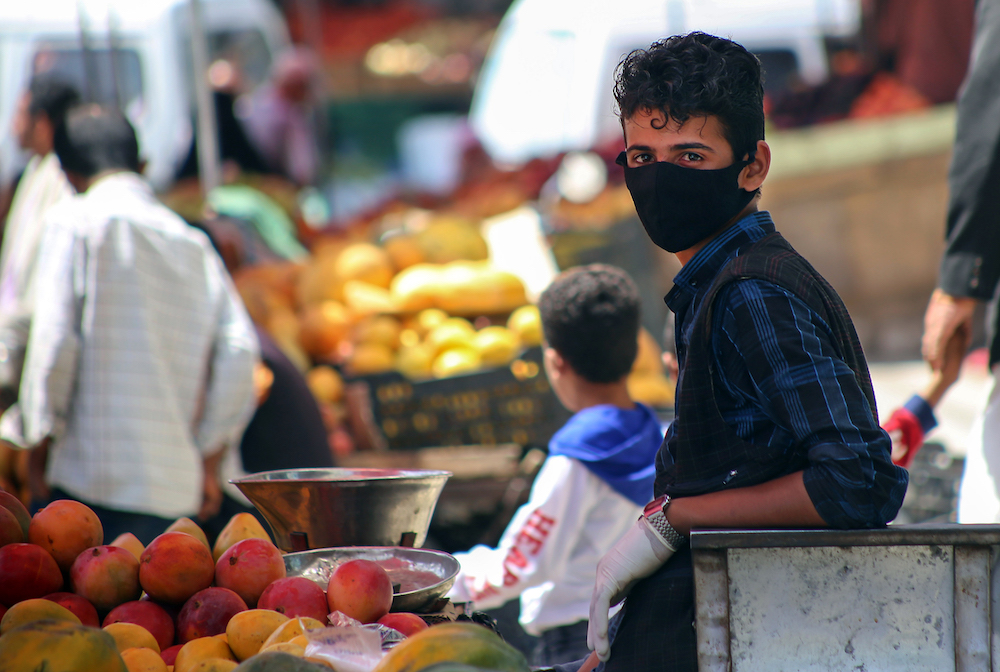
A Yemeni youth wearing a protective mask sells fruits at a street market in Yemen's third city of Taez, on June 1, 2020 amid the novel coronavirus pandemic crisis. (AFP)
“There are encouraging examples of this in the Middle East,” she said, pointing to Israel and the Palestinian government, which are working in tandem with the UN to tackle the common threat posed by the pandemic.
“We continue to strongly urge Israeli and Palestinian leaders to build on recent cooperation,” DiCarlo said.
There are other positive developments, she said. In the Gulf, the dangerous escalation of tensions between Iran and Iraq, and the region as a whole, is thought to be tapering off.
“There is this understanding of a number of parties, who have been involved or supporting different sides in this conflict, that there is a time now for negotiation and for finding a resolution to this issue. I find that encouraging," DiCarlo said.
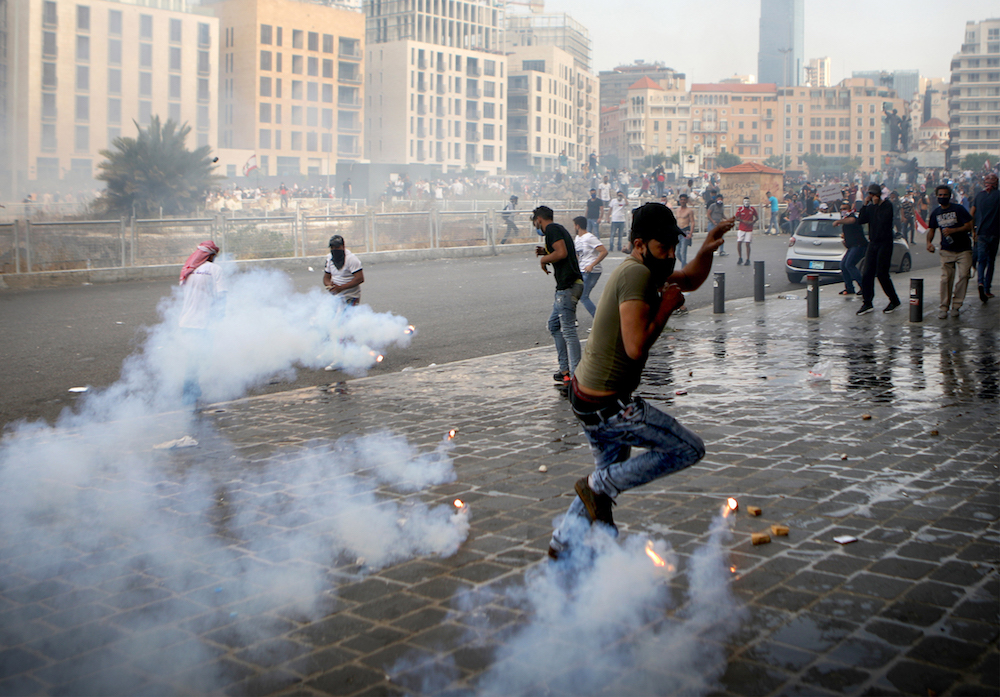
Lebanese protesters run from tear gas fired by riot police amid clashes following a demonstration in central Beirut, on June 6, 2020. (AFP)
She said despite restrictions on face-to-face meetings, the increased use of technology could create new opportunities and enhance the inclusivity of peace processes, including the participation of women and young people.
“The secretary-general and our UN envoys and special representatives continue to exercise good offices, and cajole and support conflict parties in pursuit of dialogue and cooperation,” she said.
“These efforts now rely mostly on the use of secure digital tools and platforms.”
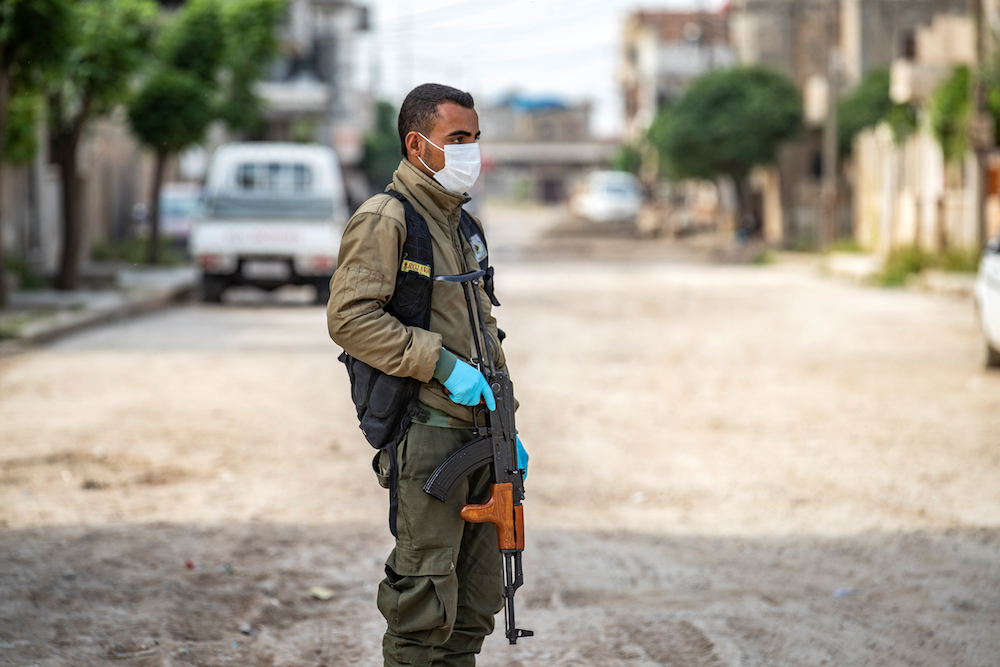
A member of the Kurdish Internal Security Forces of Asayesh stands guard on a deserted street in Syria's northeastern city of Hasakeh on April 30, 2020, following measures taken by the Kurdish-led local authorities there, to limit the spread of the novel coronavirus. (AFP/File Photo)
DiCarlo concluded her briefing on a note of optimism, saying: “I think we will overcome COVID-19. I believe so, but obviously the international community will not be unscathed.
“It will take a lot of vigilance and hard work, at the UN, between individual states or groups of countries, in civil society and among many of you," she said.
“We have a chance to go beyond recovery. We can safeguard the progress achieved over the past 75 years that helped societies prevent, resolve and rebuild from violent conflict. We can do more. We must build back better.”
--------------































